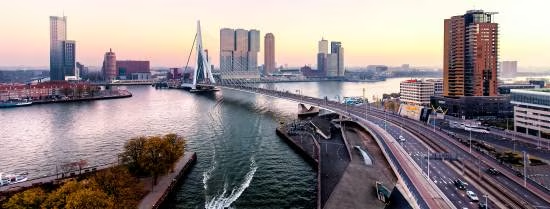How are Dutch laws and regulations experienced by people without a right of residence? That is what Mieke Kox of Erasmus School of Law researched. In total, Kox spoke with 105 people without the right of residence about their experiences. Her research shows that the law has a destructive effect on the lives of this group. "The law is not meant to be this way and has sunk through a moral lower boundary," she said.
Suppose you are in the Netherlands without a residence permit with no prospect of legal residence. What if you then get an offer to build a life in your native country with the help of an NGO? One of the interviewees from Mieke Kox's dissertation eventually took that step. Sani (not his real name) from Nigeria decided to return "voluntarily" and received support to purchase a cab. Kox spoke to a disillusioned Sani a few months later in his native country. "His situation in the Netherlands was hopeless, so he finally decided to go back," she says. "But when his cab soon broke down he fell back into poverty and was already thinking about returning to Europe. That was true of most of the people I spoke to there."

It is one of the many stories the doctoral student heard for her dissertation. In total, Kox spoke with 105 illegal aliens, some of whom thus decided to cooperate in their return. Her research focuses on how Dutch laws and regulations are experienced by these aliens and at the same time provides a disconcerting glimpse into the lives of this group. She followed some of these aliens for three years, attended departure interviews with the Repatriation and Departure Service (DT&V), accompanied them to demonstrations and even witnessed how the military police tried to put a Turkish man on a plane for his deportation in the face of great resistance. This gave her insight into how the law works for this group.
The power(less) of law
Unlawfully residing aliens (often referred to as illegals) are often seen as one group, but Kox's research shows that there is much diversity. Whereas migrant workers without legal status often live and work a relatively normal life, knowing they will have to go back when caught, asylum seekers who have exhausted all legal remedies are hit hard. "My research shows the impact of law on the lives and future plans of this group. Justice is powerful, but at the same time powerless because the government cannot enforce justice and fails to deport about half of the foreigners."
Through the moral lower boundary
Of the conversations, the helplessness and hopelessness particularly stuck with the doctoral student. From children who fell outside the child pardon and were deported to a country they never visited, to people who see their hopes of starting a family dashed. Many end up on the streets or detained multiple times without committing a crime. "The law is used to make things as difficult as possible for this group. But this is not what the law is for, especially when you see that the intended effect is not achieved," Kox said. "In my dissertation, I argue that the law has sunk through the moral lower boundary."

5-0 behind
According to Kox, there are not only legal objections to this, but it is also counterproductive. For example, the doctoral student spoke to foreigners who did intend to return, but wanted to save some money first. They lost all their possessions (sometimes multiple times) as soon as they entered detention. "The people I talked to think the policy is unfair and go into resistance mode. Labeling someone as 'illegal' doesn't help either. This puts you a conversation 5-0 behind. If you start by explaining why he or she can't be here, you start a conversation very differently."
In many cases, return (forced or otherwise) is not possible, especially with countries that do not cooperate. And the example of the Nigerian Sani shows, that even after a return, the hope for a better life in Europe remains. The current policy also leads to struggles for the Repatriation and Departure Service (DT&V). They keep hearing from politicians that it must be stricter, which creates the image that the implementation is failing. Kox: "But at the DT&V they do everything they can. Reality is often a lot more obstinate, which is why it is important to communicate the honest story. That way you also create more realistic expectations and more understanding around migration."
- PhD student
- More information
Mieke Kox was recently interviewed by Dutch newspaper NRC about her research. Read the article here (in Dutch).
- Related content

